Verbs That Start With R in English (With Meanings & Examples)
- What Are The Verbs Beginning With R?
- Common Verbs Starting With R
- Action Verbs that Start With R
- Positive Verbs That Start With R
- More Verbs That Begin With R
- FAQs
Embarking on the language learning journey is like opening a treasure chest of words, each with unique charm and utility. In this article, we dive into verbs that start with ‘R.’ These are not just any verbs; they are gateways to expanding the vocabulary for kids, making learning fun and engaging.
This guide will enrich the understanding of verbs that start with R, particularly for preschoolers and kids. Introducing these verbs aims to lay a foundation for their creativity and enthusiasm for exploring the English language. So, let’s embark on this linguistic adventure together and discover the magic of verbs, starting with R, making every learning moment a memorable journey.
What Are The Verbs Beginning With R?
Verbs encompass various actions, states, and occurrences, enriching our conversations and writings with dynamic and vivid descriptions. From ‘run’ to ‘rejoice,’ these verbs with ‘R’ at their helm invite us into a world where actions come to life, painting pictures of movement, emotion, and interaction. Whether expressing a physical activity or conveying feelings, this collection of verbs adds depth and clarity to our daily communications, making them an essential part of our vocabulary toolkit.
Common Verbs Starting With R
Diving into the alphabet, R stands out for its richness in common and critical verbs in our day-to-day language use. These English verbs, starting with ‘R,’ range from actions we perform every day to those that describe our deepest emotions and reactions to the world around us. Let’s explore these verbs to expand our understanding of their use in various contexts.
1. Run
To move faster than a walk, never having both or all the feet on the ground simultaneously.
Example: He loves to run in the park every morning.
2. Read
To look at and comprehend the meaning of written or printed matter by interpreting the characters or symbols of which it is composed.
Example: She reads a new book every week.
3. Reach
To stretch out an arm in a specified direction to touch or grasp something.
Example: He reached for the top shelf to grab the cookie jar.
4. Recycle
To process and convert used or trashed items into new objects and materials
Example: He recycled the plastic bottle into a light shade.
5. Remember
To have in or be able to bring to one’s mind an awareness of (someone or something from the past).
Example: I remember visiting the zoo when I was five.
6. Remove
To take away (something unwanted or unnecessary) from the position it occupies.
Example: Please remove your shoes before entering the house.
7. Repeat
To say or write something again or several times.
Example: Could you repeat the instructions, please?
8. Replace
To take the place of (something), especially as a substitute or equivalent.
Example: We need to replace the old printer with a new one.
9. Respond
To say something in reply.
Example: She didn’t respond to my message.
10. Rest
To cease work or movement to relax, refresh oneself, or recover strength.
Example: Let’s rest for a moment before we continue our hike.
11. Reveal
To make (previously unknown or secret information) known to others.
Example: The magician revealed the secret behind his trick.
12. Revise
To re-examine and make alterations to (written or printed matter).
Example: She revised her essay to include more examples.
13. Reward
To give something to (someone) as a reward for service, effort, or achievement.
Example: The teacher rewarded the student with a sticker for good behaviour.
14. Ride
To sit on and control the movement of (an animal, especially a horse), typically as a recreation or sport.
Example: He loves to ride his bike around the neighbourhood.
15. Roar
To make a loud, deep, prolonged sound, typically to express anger or excitement.
Example: The lion roared, signalling its presence to everyone in the area.
Action Verbs that Start With R
Action verbs help us describe specific actions, making our stories and explanations more engaging and understandable. Let’s explore 15 action-packed English verbs, starting with ‘R,’ showcasing their meanings and how they can be used in sentences to animate our language.
1. Race
To compete against others in a contest of speed.
Example: The athletes will race to determine the fastest runner.
2. Rally
To come together again to continue fighting after a defeat or dispersion.
Example: The team rallied in the second half and won the game.
3. Rank
To assign a rank or a position, often about others.
Example: She ranked first in her class based on her grades.
4. Rattle
To make a rapid succession of short, sharp sounds.
Example: The old car rattled as it drove down the cobblestone street.
5. Reach out
To attempt to communicate with someone, typically to offer or ask for help or information.
Example: He decided to reach out to his friends for advice.
6. Recite
To repeat aloud from memory before an audience.
Example: She will recite a poem at the school assembly.
7. Recognise
To identify (someone or something) from having encountered them before; to know again.
Example: I didn’t recognise him after all these years.
8. Recommend
To present as worthy of confidence, acceptance, use, etc.; to endorse.
Example: Can you recommend a good restaurant in the area?
9. Record
To set down in writing or some other permanent form for later reference.
Example: She recorded her thoughts in a diary every night.
10. Recover
To find or regain possession of (something stolen or lost).
Example: He managed to recover his lost keys.
11. Recruit
To enrol or seek to enrol (new members or participants), especially for services or employment.
Example: The company is looking to recruit new graduates this spring.
12. Reduce
To make smaller or less in amount, degree, or size.
Example: The supermarket decided to reduce prices to attract more customers.
13. Reflect
To think deeply or carefully about.
Example: She took a moment to reflect on her achievements.
14. Refuse
To indicate or show that one is not willing to do something.
Example: He refused to answer the question.
15. Regulate
To control or maintain the rate or speed of (a machine or process) so that it operates properly.
Example: The thermostat regulates the temperature in the house.
Positive Verbs That Start With R
Positive verbs represent actions and states that convey optimism, encouragement, and constructive outcomes. These verbs add a joyful and affirmative tone to our communications and inspire positivity and action in ourselves and others. Let’s delve into 15 positive verbs that start with the letter ‘R,’ exploring their meanings and how to use them in sentences.
1. Rejuvenate
To make someone or something look or feel younger, fresher, or more lively.
Example: A short vacation can rejuvenate your spirits.
2. Rejoice
To feel or show great joy or delight.
Example: They rejoiced at the news of the baby’s birth.
3. Relish
To enjoy greatly.
Example: She relished her time with her family during the holidays.
4. Renew
To resume (an activity) after an interruption.
Example: Spring is a time to renew hopes and dreams.
5. Repair
To restore (something damaged, faulty, or worn) to a good condition.
Example: Acts of kindness can repair broken spirits.
6. Replenish
To fill (something) up again.
Example: The weekend retreat helped to replenish her energy levels.
7. Resonate
To evoke or suggest images, memories, and emotions.
Example: His words resonated with everyone in the room.
8. Respect
To admire (someone or something) deeply due to their abilities, qualities, or achievements.
Example: We should always respect our elders and their wisdom.
9. Restore
To bring back (a previous right, practice, custom, or situation); to reinstate.
Example: The project aimed to restore the historic building to its original glory.
10. Result
To occur or follow as the consequence of something.
Example: Hard work will often result in success.
11. Revitalise
To imbue (something) with new life and vitality.
Example: The new park will revitalise the neighbourhood.
12. Revolutionise
To change (something) radically or fundamentally.
Example: His invention revolutionised the industry.
13. Reciprocate
To give something and take mutually or to return in kind or degree
Example: She reciprocated the feelings he expressed for her.
14. Rise
To move from a lower position to a higher one, to ascend.
Example: The sun rises in the east and sets in the west.
15. Radiate
To emit (energy, especially light or heat) in the form of rays or waves.
Example: She radiates positivity wherever she goes.
More Verbs That Begin With R
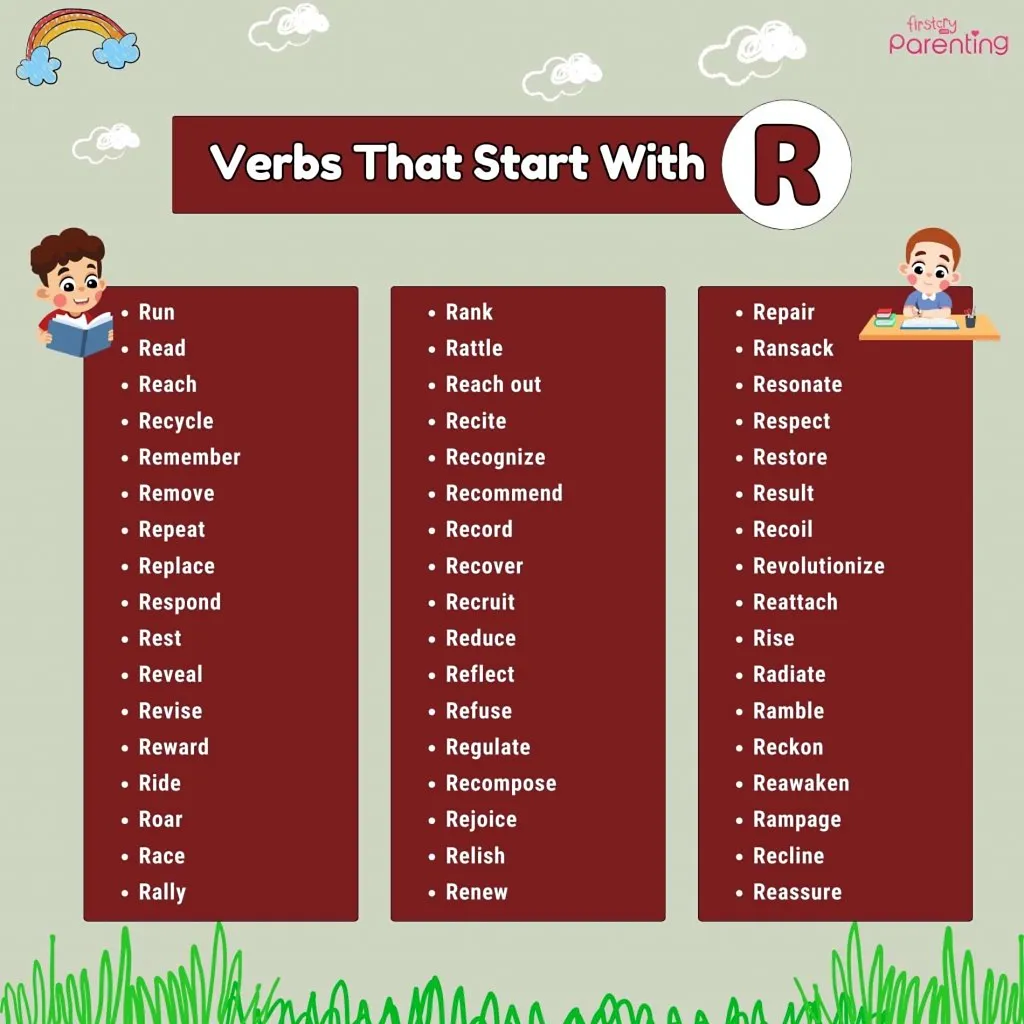
Beyond the verbs we’ve explored so far, the English language is abundant with more verbs that begin with ‘R,’ each carrying distinctive meanings and applications. This extended collection allows for refined expression and adds depth to our communications. Here, we present additional verbs with ‘R’ to expand your vocabulary.
| Verb | ||
| Ramble | Reckon | Reawaken |
| Rampage | Recline | Reassure |
| Ransack | Recoil | Reattach |
| Rasp | Recompose | Recalculate |
| Ratify | Reconvene | Recap |
| Rattle | Recount | Recapture |
| Ravage | Recover | Recast |
| Rave | Recreate | Recharge |
| Rebuild | Rectify | Recheck |
| Rebut | Realign | Reckon |
| Recant | Reap | Reclaim |
| Recap | Rearrange | Recollect |
| Recede | Reason | Rebuke |
| Receive | Reassemble | Reconcile |
| Reclaim | Reassert | |
This table encompasses a variety of verbs, from those describing physical actions and changes, like ‘rampage’ and ‘rebuild,’ to those that relate to mental processes and interpersonal interactions, such as ‘reason’ and ‘reconcile.’ Each verb enables us to describe our world and actions with greater precision and colour.
FAQs
1. What easy verbs start with ‘R’ for kids to learn?
Easy verbs that start with R for kids to learn include ‘un,’ ‘read,’ and ‘ride,’ as they are everyday actions that children can easily understand and use in their daily conversations.
2. How can learning verbs starting with ‘R’ enhance a child’s vocabulary?
Learning verbs starting with R can significantly enhance a child’s vocabulary by introducing them to various actions and states, thereby improving their ability to express themselves clearly and effectively in spoken and written English.
Verbs offer a fascinating glimpse into the versatility and richness of the English language, providing learners of all ages with tools to express a wide range of actions, emotions, and states. Exploring and incorporating these verbs into our vocabulary enhances our language skills and enriches our communication, making it more vibrant and expressive. These verbs are essential in crafting meaningful and engaging narratives for educational purposes, creative writing, or everyday conversation.
Also Read: Verbs That Start With A to Z
| A | B | C | D | E | F | G | H | I | J | K | L | M |
| N | O | P | Q | R | S | T | U | V | W | X | Y | Z |
Was This Article Helpful?
Parenting is a huge responsibility, for you as a caregiver, but also for us as a parenting content platform. We understand that and take our responsibility of creating credible content seriously. FirstCry Parenting articles are written and published only after extensive research using factually sound references to deliver quality content that is accurate, validated by experts, and completely reliable. To understand how we go about creating content that is credible, read our editorial policy here.






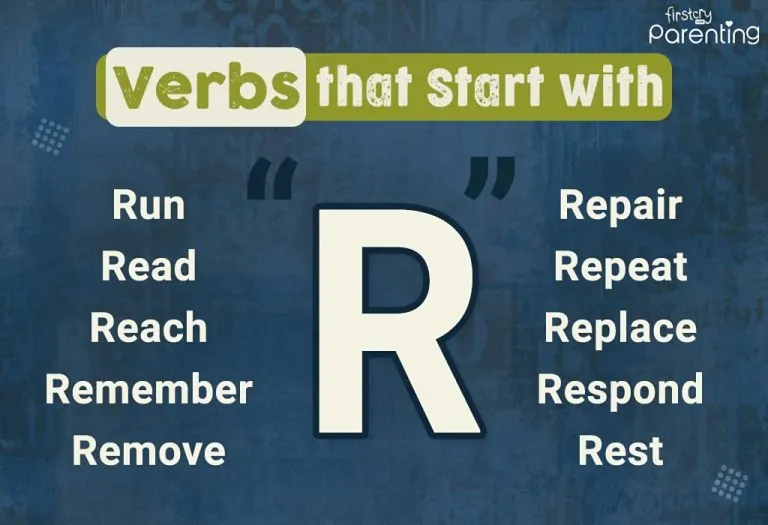
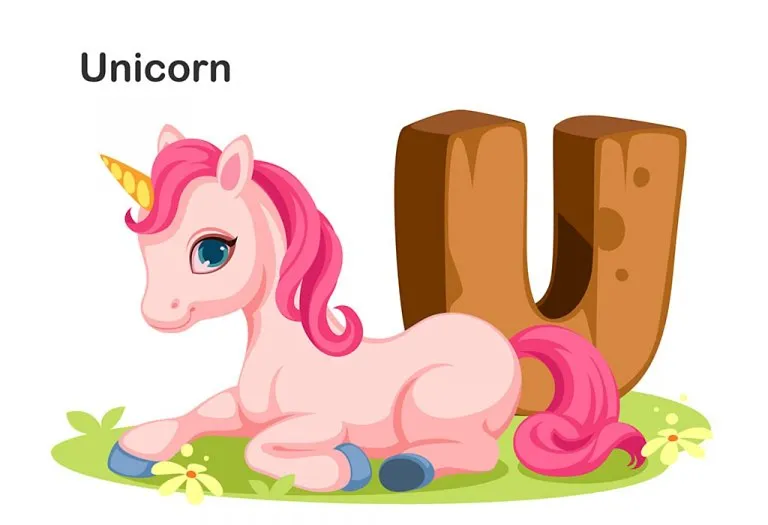
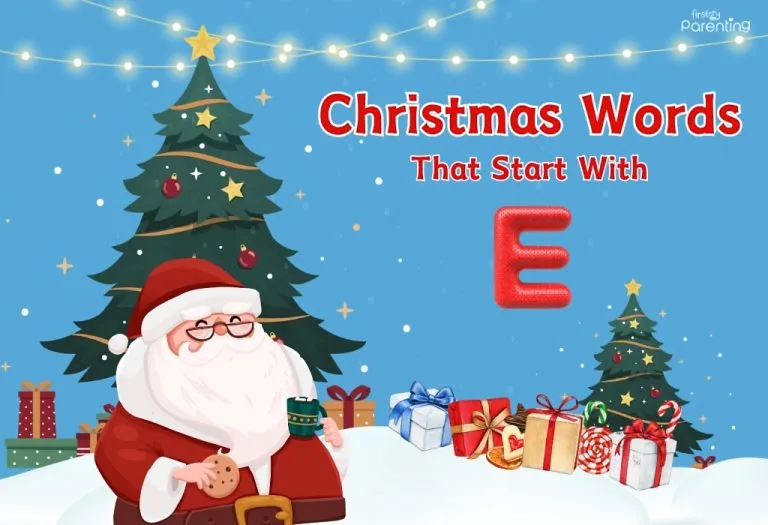
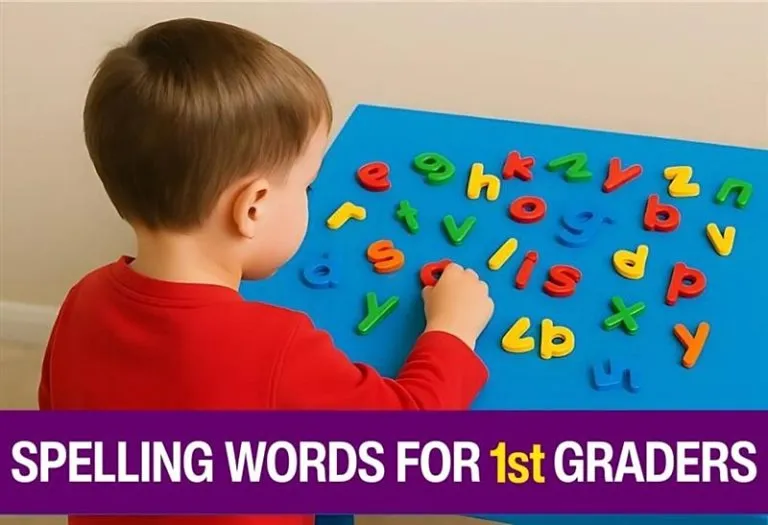
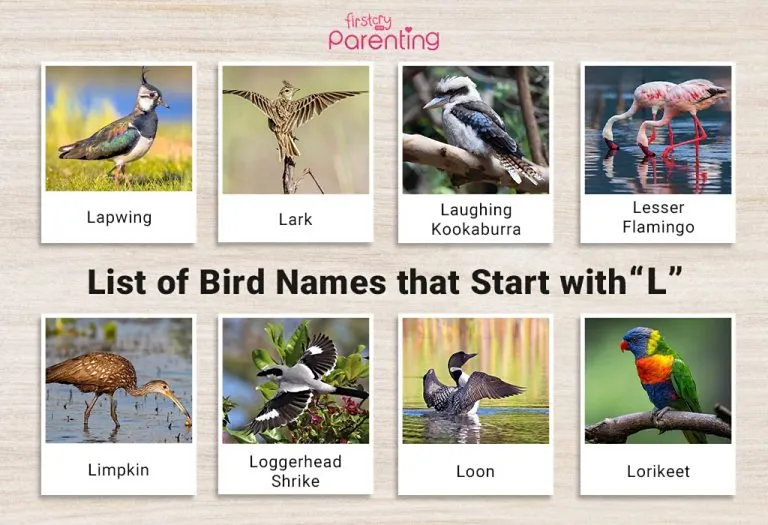
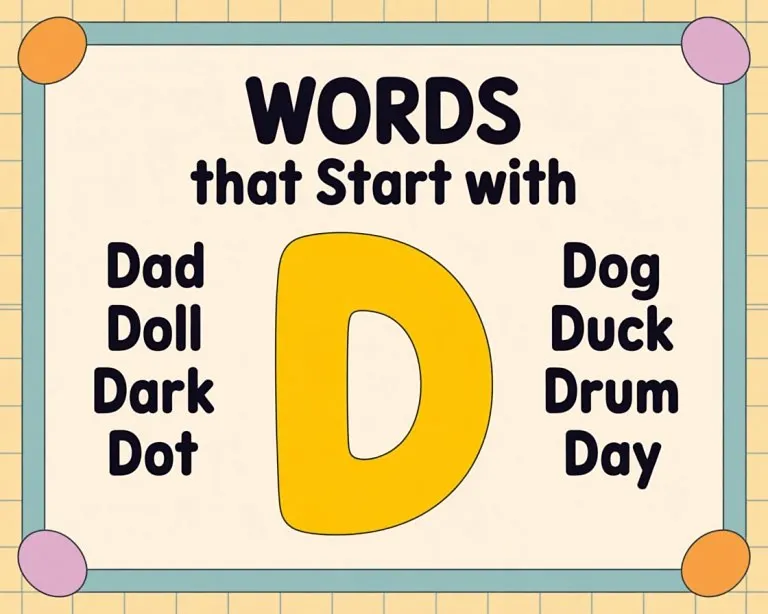
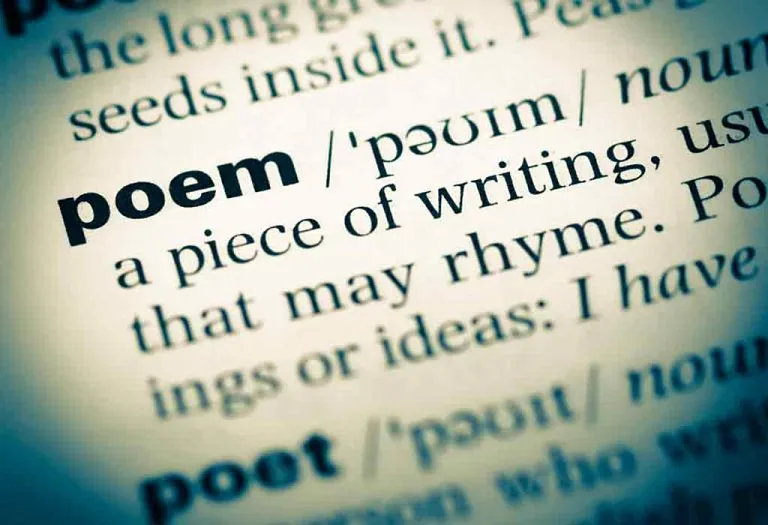

.svg)
















